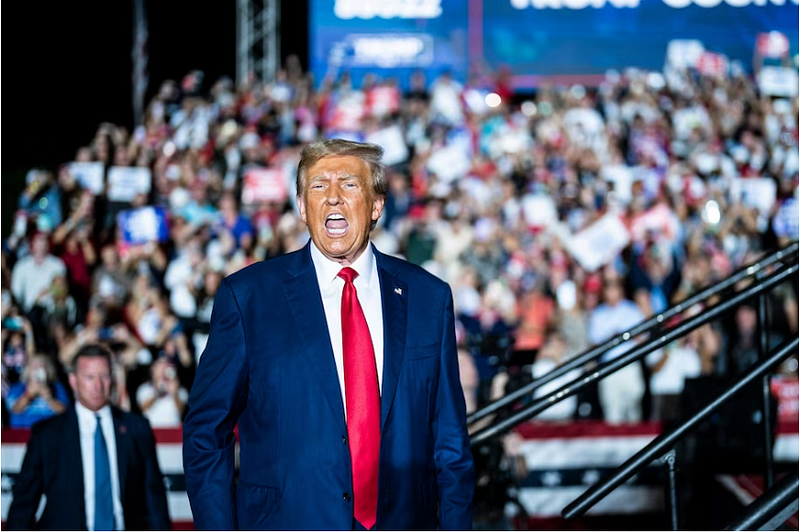
56.6 percent. With every passing hour, Trump’s grip on the 2024 Republican nomination grows tighter and the reality of a Biden versus Trump rematch resurfaces. America inches closer toward the inevitable precipice of authoritarianism.
The third Republican primary debate was the chance to turn the sails on a race seemingly over before it even started; but it was in vain. Despite his refusal to present himself on stage, Trump’s public relations strategy seems to have paid off, effectively eclipsing his political candidates by a landslide. As per the Nov. 13, 2023, Five Thirty Eight poll, Trump’s election hegemony remains uncontested, with support from 56.6% of Republican voters in comparison to runner-up Ron DeSantis’s 14.1%, Nikki Haley’s 8.2% and Vivek Ramaswamy’s 5.3%. Indicted on 91 criminal counts over four separate cases, notably the mishandling of classified documents, obstruction of justice and conspiring to overturn the presidential election, Trump’s hand in the 2024 election strengthens as his legal woes worsen. The question begs to be asked: how can Trump turn a recipe for his downfall into political opportunity? The answers lie within the world of history’s most infamous dictator: Adolf Hitler.
To consolidate his power, Trump has no shame around adapting plays from the Nazi playbook. While in office, Trump has repeatedly used slogans by Nazi sympathizers, invited white supremacists for dinner and attacked both the press and political pundits as “enemy of the people.” Days prior to the Capitol insurrection, Trump-appointed military General Mark Miley called out the impending “Reichstag moment,” in reference to Hitler’s failed 1923 coup attempt to overthrow the democratic Weimar regime. In both cases, stolen-election lies were propagated, blame on political foes were spewed and violence erupted as a result. Today, Trump’s rhetoric continues to follow a traditional Nazi blueprint: while at a campaign rally in Hialeah, the former president called his political opposition “vermin” and labeled them as “threats from within.” At an Iowa rally, Trump blamed immigrants for “poisoning the blood of our country,” a line pasted from Hitler’s
Mein Kampf
. By dehumanizing the opposition, both Trump and Hitler piggyback on these false narratives while rising in popularity and emboldening their most fervent supporters. In other words, the more Trump feeds into the “political witch hunt” he believes he is a victim of, the more Republicans are convinced of his presumed innocence. Hitler’s revenge plot worked in 1924. Trump hopes for a similar fate in 2024.
Beyond their rhetoric, both Trump and Hitler benefit from severe fractionalization due to infighting within their respective political camps. While on trial in 1924, Hitler’s fervent self-defense stuck with Germans at a time where any single dominant political figure was yet to stand out. Soon after his release, radical right-wing Germans rallied around Hitler, propelling his rise to fame and power. A century later, the GOP political landscape is rife with weak political opposition Trump can benefit from to remain in the limelight. Over the course of his campaign, Ron DeSantis has proven ineffective at nullifying the former president, while the Republican debate in Miami showcased Ramaswamy, Christie, Haley and Scott exchanging blows among each other rather than directing them at the frontrunner. During the first Republican debate, all candidates on stage, with the exception of Christie, declared they would support Trump as the nominee even if he were to be convicted. From the perspective of an undecided Republican voter, when the quasi-majority of GOP presidential candidates see Trump’s legal hurdles as vastly unjustified, that individual is more likely to follow suit and support Trump’s innocence. Free from any considerable opposition, Trump’s crushing dominance is anything but a surprise.
As popular political figures, Trump’s and Hitler’s strategies of self-victimization engineer a sentiment of mistrust with government institutions. Hitler’s passionate defense speech repeatedly pointed fingers to the democratic German government’s responsibility in losing WWI, placing nationalistic arguments at the forefront of his vindication. More importantly, Hitler committed himself to the cause of all Germans. While the majority of his trials are expected to be held in the coming months, political analysts predict Trump will take on the language of victimization in hopes of rallying support. Despite his legal loss in the E. Jean Caroll case, Trump framed his legal troubles as “it being not just about me,” as a representation of all Americans who are wrongly convicted for crimes they did not commit. By playing the role of a victim of shameful political persecution, Trump attempts to fuel a fire of GOP distrust toward the government, translating to increased election support in Nov. 2024.
For those dreading the possibility of another Trump presidency, please be warned: history has a tendency of repeating itself. 100 years ago, Hitler rose the political ladder to fame thanks to a concoction of extreme nationalist rhetoric, self-victimization and hyper partisan fragmentation. As a result, six million innocent Jews were killed in one of history’s deadliest genocides. 2024 could be a turning point for Trump and America as we know it. Will we come to see the extinction of our foundational democratic principles and the establishment of an authoritarian state? While today, we witness Trump following the path charted by Hitler, tomorrow, we must ensure his rise’s darkest consequences never come to fruition.
























